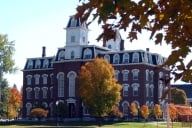You have /5 articles left.
Sign up for a free account or log in.
Temple University on Monday announced that its business school had submitted false data for years for rankings purposes. The university said that it had asked Moshe Porat, dean of the business school, to resign, saying that he had dismantled the business school's system for verifying the accuracy of data being submitted for rankings. An outside review found that the employee responsible for preparing the data said he did so at the dean's direction, although Porat denied this to the outside investigator.
The reports of falsehoods started in January, when U.S. News & World Report said that Temple's online M.B.A. program was being stripped of its rankings because it had reported that 100 percent of its online M.B.A. students had submitted standardized test scores, when in reality only 20 percent had done so. Score averages count for less in the U.S. News methodology when fewer than 75 percent of students have taken standardized tests. Then the website Poets & Quants noted that Temple had claimed 100 percent test taking for its online students for four years -- and been the top-rated online M.B.A. in each of those years. Because Temple's online M.B.A. does not require standardized tests of applicants, the 100 percent figure seemed unlikely to many. Temple promised an outside investigation and hired a prominent law firm, Jones Day, to conduct one.
Among the findings released Monday:
- For ranking years 2015 through 2018 (typically with data coming from the prior year's new students), Temple's reports that all admitted applicants had taken the Graduate Management Admission Test were wrong. The actual number was "significantly lower" than the 100 percent figure given. U.S. News asks business schools to report both GMAT and Graduate Record Exam scores (as some business school applicants take the GRE). Temple just converted GRE scores (which were supposed to be provided with breakdowns on various parts of the exam) into GMAT scores, and said that no applicants took the GRE. The Jones Day report indicated that, at one point, U.S. News raised questions about the 100 percent test-taking applicants, but did not pursue the issue when Temple provided more false information.
- For ranking years 2015 through 2018, undergraduate grade point averages were "inflated through use of various methods." One of those methods was to take GPAs listed as a 1/100 value and improving them to the "next highest" 1/10 value. As an example, the Jones Day report said that this would mean reporting 3.22 as 3.3. U.S. News asked business schools to report mean GPAs, but Temple sometimes gave the mean and sometimes reported the median (using the inflated statistics either way).
- For ranking years 2017 and 2018, Temple underreported the number of admissions offers, implying that the program was more selective than was the case.
- For ranking years 2016 through 2018, Temple provided false information about debt. U.S. News asks business schools for the average debt among graduates who borrow. Temple reported instead the average for all graduates, thus lowering the average debt level.
- For ranking years 2016 through 2018, Temple counted both faculty members and "academic coaches" in a formula to determine student-faculty ratio.
Much of the blame in the report goes to an unidentified employee charged with preparing rankings material. That employee, the Jones Day report said, "knowingly misreported data" and "allegedly did so at the dean’s direction in the presence of another employee. The dean and the other employee deny that such direction was given."
Porat, the now former dean, did not respond to an email request for comment from Inside Higher Ed.
A Temple spokesman said that Porat, as a tenured faculty member, has the right to return to teaching at the business school. Porat had been dean since 1996. In 2001, the Academy of International Business selected him as the 2001 International Dean of the Year.
U.S. News officials also did not respond to requests for comment. In January, asked about the apparent problems with the Temple data, U.S. News released a statement that said, "U.S. News relies on schools to accurately report their data. In this case, the Fox School of Business submitted the data on its own during the summer and fall 2017 data collection period and also completed the data verification process, assuring U.S. News that the data were accurate."
A Culture Focused on Rankings
Regardless of whether Porat authorized the fabrications, Temple and the Jones Day report hold him responsible for what happened.
"It was the dean’s initiative to disband a longstanding committee charged with ensuring the accuracy of rankings data," said a campuswide email sent by Richard M. Englert, the president. "This absence of checks and balances, together with an undue focus on rankings, enabled such misreporting. While we are committed to determining the nature and extent of possible incorrect data reporting regarding other academic programs at Fox, one thing is clear: This is contrary to the fundamental value of integrity that is at the heart of our academic mission."
Beyond the removal of the checks and balances, the Jones Day report also described an environment of ratings focus at the Fox School of Business, which offers both undergraduate and M.B.A. programs. The rankings falsehoods were found in the online M.B.A. program.
"The investigation revealed that (i) the dean and other Fox personnel made clear that improving or maintaining Fox’s position in rankings was a key priority; (ii) Fox had in place a concerted, rankings-focused strategy including detailed analyses of U.S. News’s rankings methodology and strategies tied to specific U.S. News data metrics, which strategy was promoted internally by the dean and other Fox personnel; and (iii) the environment fostered by the school’s emphasis on rankings contributed to the reporting of inaccurate information to U.S. News," the report said. "Moreover, the dean’s focus on rankings, coupled with his personal management style, caused Fox personnel who interacted with the dean on ranking-related matters to feel pressure to perform in this regard."
"For example, Fox touted the [online M.B.A.] program’s fourth straight #1 U.S. News ranking in an email on January 22, 2018, notwithstanding that its leadership had learned more than ten days before that the survey response included inaccurate data," the report said. "Praise for such achievements was also given at the individual employee level. Most significantly, in annual performance reviews and otherwise, the employee principally responsible for rankings surveys received very favorable assessments of the employee’s rankings-related work, and was even given credit not just for compiling and organizing information for submission to rankings agencies, but also for improvements in Fox’s rankings positions."
Other Rankings Errors
U.S. News regularly announces updates to its rankings when it receives reports -- many times from colleges themselves -- that they have submitted inaccurate information. Many times, colleges blame human error. The Temple situation would appear to be the largest scandal in recent years involving rankings of various types.
Here are some of the other notable cases.
- In 2011, the American Bar Association imposed public censure on the law school of Villanova University over its past practice of reporting inaccurate grades and Law School Admission Test scores of incoming students in an apparent bid to improve its standing in the rankings.
- In 2013, Tulane University admitted to sending U.S. News inaccurate information about the number of applicants and test scores of applicants to its business school.
- In 2012, Claremont McKenna College admitted that it had been submitting inaccurate class ranks and SAT scores on its students to U.S. News. The motive wasn't purely about rankings. Officials disagreed with a college strategy to focus on rankings by admitting only students with top scores and grades. To admit a broader range of students, the admissions office submitted incorrect data so that it could meet the college's goals while also admitting students without perfect grades and test scores.
- In 2013, Bucknell University admitted that it had misreported SAT averages from 2006 through 2012, and ACT averages during some of those years.








